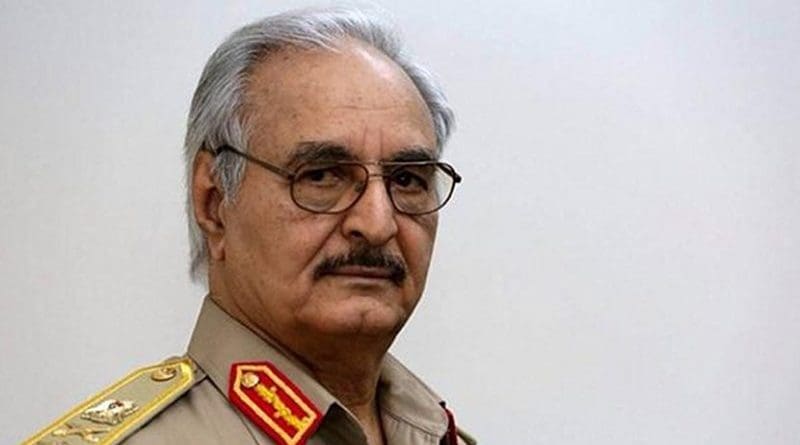Did Berlin Conference End Libya’s War? – OpEd
The German government has invited the warring parties in the North African country and their foreign supporters to the chancellery in Berlin. The hope to end the war, they are seeking to achieve stability for the whole region.
The German governments did that through long-term goal is “a sovereign Libya” and an “inner-Libyan reconciliation process,” under the invitation to the conference in Berlin, but Libya nowadays is still a long way from that.
Libya has a conflict with an internationally recognized government in Tripoli led by Fayez Sarraj, but it controls only a small part of Libya.
Meanwhile, rebel General Haftar and his militias are increasingly putting the government under military pressure. Haftar controls most of the country, including much of its oil fields.
The situation is complicated everyday by the intervention of foreign powers Turkey to support the government in Tripoli they sent soldiers to Libya. On the other side, Egypt, Saudi Arabia, the United Arab Emirates and Russia are backing Haftar, and are more or less openly providing him with military assistance.
While, the German government put forward the idea of holding a conference in Berlin to obtain a “real” commitment to respect the arms embargo and they push Haftar and Sarraj to accept the international community’s they needs “no military solution, only a political one”.
On the other hand, Libya also got a supports from European Union they divided to “France said we will support Haftar, while Italy, the former colonial power, is said to be close to Sarraj, and this situation is very strange.
According to that German government invited the highest representatives to the chancellery in Berlin: the two rivals, Sarraj and Haftar, the heads of state and government of all the main countries directly and indirectly involved, as well as representatives of the European Union, the African Union and the Arab League. Because the meeting is being overseen by the United Nations, UN Secretary-General Antonio Guterres.
Rainer Breul, the spokesperson for the German Foreign Office, said the focus is not yet on peace negotiations, our goal is for international actors to agree on framework conditions to reduce their influence on the ground.
The significance of the Berlin conference, however, extends further than Libya, the key to the further stabilization of North and West Africa. If we succeed in leading Libya into a peaceful future, it would be a milestone for the entire region.
Western roles inside Libya
There are many western countries wants to control Libya. If we look at each one, we will find their personal interests in the following: Turkey responded to the pleas of the Government of National Accord (GNA) from Serraj to intervene militarily they got their support from Erdoğan’s because US Withdrawn from ’Middle East it could give chance to other country to join and get a part from Libya.
According to that Europeans countries have woken up they wants to return the role again, because they loss of prestige and relevance , mostly Italy , after months of neglecting this issue, realized its own sudden irrelevance and jumped again from long time they have a good Economic relations with Libya Especially in the export of gas, oil and port fields. On the other hand, the Middle East countries like Egyptians and the Emirati leaders they supporters Haftar, because they are an enemy of Turkey.
When America withdrew, Russia intervened to regain its position in the Middle East so that they chose Libya. Putin and Erdoğan now understand that the two of them could in effect play a determinant role in mediating between the Libyan factions and thus reaching an almost exclusive position of power in the North African country.
Overall, the fact that Moscow and Ankara took this initiative underscores what has been evident for months they did ceasefire agreement but Haftar refuse to sign it. The agreement contained seven points following by: “determine a line of battle contact to ensure a sustainable ceasefire”, appoint five representatives each to a military ceasefire monitoring commission, and appoint representatives to future economic, military and political negotiations under UN aegis. These last two points already form the backbone of a roadmap.
Due to that agreement Haftar refused to sign because the ceasefire terms were too vague, and could have been interpreted as requiring him to withdraw his forces from Tripoli and environs at a moment when he feels the balance of power is in his favour.
In the wake of the failed Moscow meeting maybe Berlin conference could be a trap.
The governments realized the failure of the Moscow conference, but this conference represents the political transformation in the Middle East if all goes according to plan, representatives of the U.S., EU, UK, France, Russia, China, Italy, Germany, Turkey, Egypt, the UAE, Algeria and Congo-Brazzaville, as well as the UN, Arab League and African Union, will sign a 55-point declaration. Key items include support for a ceasefire, a commitment not to violate the UN arms embargo on Libya, and a pledge to support a UN “operational” plan for political, security and economic consultations aimed at unifying the country.
Moreover, the leaders want to credible steps” toward dismantling armed groups and militias following the demand Haftar made to this effect in Moscow.
After all, the Europeans found the solution it will be in the Berlin conference. The meeting would provide the perfect stage for this ultimate act of betrayal, they will show at the end of the conference the acceptance by Haftar’s entire future role and the legitimization of his attack against Tripoli.
The leaders will fall into the trap through a project in the pipeline to empower a new civilian government of “national unity” led by a new prime minister by elections would be organized as soon as possible and if Haftar wins, all the better for the plan’s sponsors. But if is not …we will see.

